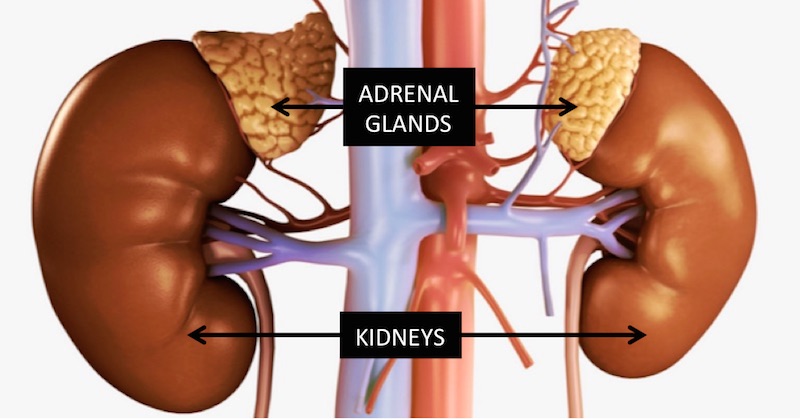A Simple Eye Test To Tell If Your Adrenals Are Fatigued And What You Can Do
Last updated on
In this day and age, everyone is constantly busy. Busy working, busy cooking, busy cleaning, busy socializing. People have very little time to themselves to just put their feet up and relax. This constant activity with minimal downtime usually leads to high levels of stress, which itself causes problems that only end up making you even more stressed.
This cyclic effect drove me to do some research on what stress does to the human body and I ended up reading Dr. James Wilson’s book Adrenal Fatigue: The 21st Century Stress Syndrome. What I found out shined so much light on how stress affects our hormones, what it does to our body, and what we can do to stop it.
What Is Adrenal Fatigue?
Adrenal fatigue is exactly what the name suggests: fatigue of the adrenal glands. The adrenal glands sit on top of the kidneys and produce various hormones that not only determine how we react to stress, but also affect our body’s weight, blood sugar, blood pressure, the way our body uses nutrients, and even our libido.
One of the hormones that the adrenal glands produce is called cortisol. This is the hormone that helps your body deal with stress and as a defence mechanism, is produced every time you experience it. Fatigue occurs when you experience stress on such a constant basis that your adrenals can no longer keep up with production and replenishment.
What Are Adrenal Fatigue Symptoms?
According to Dr. Wilson, adrenal fatigue can be different for everybody. However, if you are experiencing any of the following symptoms you may be suffering from it.
- More sensitive to stress
- Lower cognitive function
- Chronic exhaustion
- Short temper
- Confusion when under pressure
- Feeling cold constantly
- Lightheadedness
- Low sex drive
Think You Might Have Adrenal Fatigue?
If you are experiencing any of the symptoms listed in the above adrenal fatigue checklist, then you should take the Iris Contraction Test. However, keep in mind that I am not a doctor and this is not medical advice or a diagnosis. I’m just passing along what I read and found most informative.
This test is going to help you measure your body’s stamina in response to light stimulation. If, according to this test, your stamina has decreased, along with the overall symptoms, it may indicate your adrenals are having difficulty supporting you through stressful events.
Iris Contraction Test
Your iris is a small, round muscle comprised of tiny threads that contract and dilate the pupil in response to light. Like any muscle in your body, if you strain it to the point of exhaustion, it will eventually stop working efficiently for a period of time while it takes its much needed break. So, when you are making your pupil contract, you are actually straining a muscle in your body. In terms of the iris, pupil dilation is this muscle’s way of resting.
This test can be used to detect adrenal fatigue because if you are experiencing it, your pupil will not be able to hold its contraction for more than 2 minutes. You should do this test on a monthly basis and record your results.
You will need:
- Weak flashlight or penlight
- Chair
- Stopwatch
- Mirror
- Dark room
Directions:
- Sit in a dark room in front of the mirror for about a minute to allow your eyes to adjust.
- Once you feel comfortable, shine the flashlight from the side of your head across one eye, but not directly into it. Your flashlight should be about 6 inches away from your face.
- Continue shining the light across your eye and look in the mirror with the other. You should see your pupil contract immediately as the light hits your eye. Then it will dilate.
- With your stopwatch, time how long the contraction lasts and record it along with the date.
Keep in mind that if your pupil doesn’t hold the contraction for a long period of time, this is an early indication of adrenal fatigue. As you do this test on a monthly basis, you might find that your iris will hold its contraction for longer periods of time. This is actually a good thing; it indicates that you are recovering from adrenal fatigue.
You may find that, instead of completely dilating, your pupils will “pulse”, which may be a symptom of adrenal fatigue as well. However, the biggest indication of adrenal fatigue is if your pupil doesn’t contract at all. If you have conducted multiple tests and find that your pupil is not contracting, or its contraction time is not increasing, then you may be suffering from adrenal fatigue.
What Can You Do To Help Your Adrenals Recover?
Although the Iris Contraction Test is a fairly accurate way to signal adrenal fatigue, if you suspect you might be experiencing it, you should check with your doctor to make sure. They will likely ask you to take a saliva cortisol test, which measures your cortisol levels. In the meantime, here are some changes you can make in your life to help prevent or treat adrenal fatigue:
- (If possible) Avoid very stressful situations i.e. getting into arguments or altercations, working overtime, high workload
- Perform light to moderate exercise such as walking, swimming, yoga or tai chi
- Make sure to get at least 8 hours of sleep at the right time
- Avoid foods that are high in sugar or refined carbohydrates
- Make sure to eat lots of fruits, vegetables and lean meat
If you think you are experiencing adrenal fatigue, let us know how it’s affecting your life and what you are doing to fix it.
References:
https://www.mommypotamus.com/how-to-test-for-adrenal-fatigue-at-home/
https://adrenalfatiguesolution.com/testing-for-adrenal-fatigue/
Some of the links I post on this site are affiliate links. If you go through them to make a purchase, I will earn a small commission (at no additional cost to you). However, note that I’m recommending these products because of their quality and that I have good experience using them, not because of the commission to be made.












 JOIN OVER
JOIN OVER
Comments